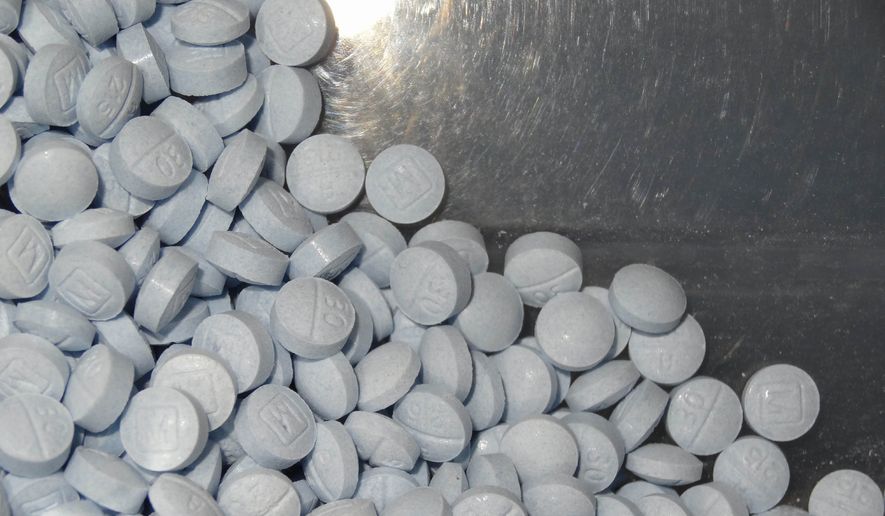Health experts are raising concerns over physicians prescribing opioids to COVID-19 “long haulers,” saying it could lead to an increased risk of addiction among those who experience coronavirus symptoms long after having been infected.
Doctors wrote nine more prescriptions for opioids for every 1,000 long COVID patients who were treated at a Veterans Affairs facility than they normally would have and wrote 22 additional prescriptions for potentially addictive sedatives such as Xanax to treat anxiety, according to a study published last week in Nature.
“I think the main take-home message here is that long COVID can manifest in pain. In some cases, we see it being treated with opioids. If this continues, we worry that this may exacerbate the opioid epidemic. We want people to be aware of this, and make sure that they avoid to the extent possible using medications with addictive potential,” said Dr. Ziyad Al-Aly, the paper’s lead author.
Dr. Al-Aly, chief of research and education service at the VA St. Louis Health Care System, said it is possible that doctors are prescribing more opioids to long COVID patients because the illness can manifest with pain that may be severe and disabling for some.
Anyone who has had COVID-19, even with no or mild symptoms, can develop long COVID, according to the Centers for Disease Control and Prevention. Such patients have reported a range of symptoms, including fatigue, headache, loss of taste or smell, and dizziness.
A new CDC study found that 69% of 3,171 non-hospitalized adult COVID-19 patients had one or more outpatient visits 28 to 180 days after diagnosis. Two-thirds had a visit for a new primary diagnosis, and about one-third had a new specialist visit, says the study, published this month on the CDC website.
Dr. Al-Aly’s study, which included more than 73,000 patients, found that many had experienced significant muscle and bone pain, respiratory and cardiovascular conditions, and gastrointestinal issues.
Dr. Greg Martin, president of the Society of Critical Care Medicine, described the findings of Dr. Al-Aly’s study as “extremely concerning.”
“The study shows that joint pain is increased after COVID-19, so perhaps musculoskeletal pain or even more generalized pain is part of long COVID, and we need to find the proper non-narcotic treatment for it just like we do with other forms of chronic pain,” Dr. Martin said.
The national opioid dispensing rate began to increase in 2006, peaking in 2012 at more than 255 million prescriptions and a dispensing rate of about 81 prescriptions per 100 persons, the CDC says.
The dispensing rate dropped from 2012 to 2019, reaching its lowest point. In 2019, the rate had declined to about 47 prescriptions per 100 persons for a total of more than 153 million opioid prescriptions.
But in 2019, dispensing rates still remained high in certain areas of the country, the CDC says, noting that 5% of counties dispensed enough opioid prescriptions for every resident to have one. Some counties had dispensing rates that were six times higher than the 2019 rate of 47 prescriptions per 100 people.
About 88,000 people died in the U.S. from drug overdoses in the 12-month period that ended in August 2020, the highest number of overdose deaths recorded in a year, the CDC said this month. The provisional data suggests that overdose deaths have increased during the COVID-19 pandemic.
“As we’ve seen during the opioid crisis, opioid analgesic medications come with risks that include the possibility of developing addiction or experiencing an overdose. However, opioid medications are also vital tools for the treatment of pain,” said Dr. Wilson Compton, deputy director of the National Institute on Drug Abuse (NIDA).
Dr. Compton noted that COVID-19 is a respiratory illness and opioids suppress breathing, adding “it may be prudent for COVID patients receiving opioids to receive co-prescriptions for naloxone to reduce risk of overdose.”
Dr. Al-Aly said it is possible that the trajectory of the opioid crisis could shift back to prescription opioids again if “we don’t heed the warning and proactively manage this now before it balloons into another crisis.”
“The data is clear: We need action on a national scale to deal with long covid in a way to optimize the health and well-being of long haulers, and prevent further death and suffering,” he said.
• Shen Wu Tan can be reached at stan@washingtontimes.com.




Please read our comment policy before commenting.